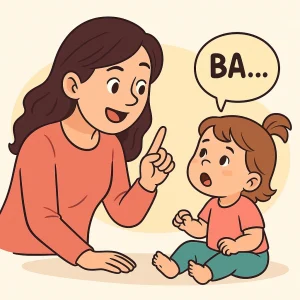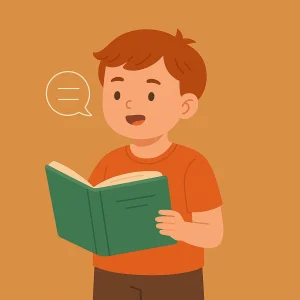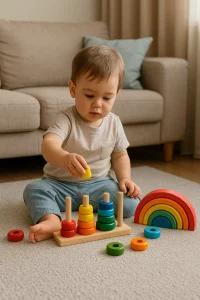6 WH Question Activities for Speech Delay at Home
By Wellness Hub
Last Updated: February 24, 2025
Speech delays in young children are common, but addressing them early can make a huge difference. WH Questions for Speech Delay—like ‘who,’ ‘what,’ and ‘where’—are excellent tools for enhancing speech development. These simple questions can transform daily interactions into powerful learning moments, helping children progress in their language skills. Join us as we explore easy, effective activities to support your child’s communication journey right at home, ensuring every new word is a milestone to celebrate.
What is Speech Delay?
Have you noticed your toddler isn’t quite chatting as much as others their age? This could be a sign of speech delay, a common developmental hiccup that affects many young children. Speech delay refers to a condition where a child’s language skills aren’t developing as expected for their age. It’s not just about being a late talker; it’s about struggling to form words, put sentences together, or understand what others say.
Also read: Understanding Speech Delay: Causes, Milestones, and Therapy
Impact on Child Development
Speech is more than just forming words; it’s a crucial tool for learning, interacting, and expressing needs and emotions. When speech development lags, it can ripple across a child’s overall cognitive and social abilities. Early language skills are foundational—they help in building relationships, thinking critically, and succeeding academically.
What Are WH Questions?
Definition and Importance
Have you ever wondered how simple questions can play a pivotal role in language development? WH questions are the tools that prompt curiosity and elicit detailed responses. They include ‘Who,’ ‘What,’ ‘When,’ ‘Where,’ ‘Why,’ and ‘How.’ Each of these question types serves a unique purpose in encouraging communication and enhancing language skills.
Also read: WH Questions for Speech Delay: Practical Strategies for Parents
Who questions ask about people, What about things or actions, When about time, Where about places, Why about reasons, and How about methods or processes. These questions are crucial because they require more than yes/no answers and challenge children to think and express themselves in complete thoughts.
Examples of WH Questions
Integrating WH questions into daily interactions with your child is not just beneficial—it’s also simple and can be quite fun. Here are practical examples of each type of WH question, along with contexts where they can naturally encourage speech and language development:
Who
- Question: “Who is coming to visit us today?”
- Context: Use this question when expecting a visitor or talking about family members to encourage your child to think about relationships and names.
What
- Question: “What are you drawing?”
- Context: During drawing or playtime, this question helps your child describe their activities and the objects they are using, expanding their vocabulary.
When
- Question: “When will we go to the park?”
- Context: Ask this before typical outings or events to help your child understand time concepts and sequence of activities.
Where
- Question: “Where did you put your shoes?”
- Context: This question can be used during daily routines to encourage your child to recall and describe locations, enhancing their memory and expressive skills.
Why
- Question: “Why do we brush our teeth?”
- Context: Use this question during routine health and hygiene activities to encourage reasoning and connect actions with outcomes.
How
- Question: “How do you tie your shoes?”
- Context: During dressing or when learning new skills, this question prompts detailed explanations and sequences, which are great for cognitive development.
Lear More: How to Improve Your Child’s Language Skills with WH Questions
Connecting WH Questions to Speech Development
When it comes to nurturing your child’s speech and language development, WH questions can be incredibly powerful. Not only do these questions make conversations more interactive, but they also play a crucial role in diagnosing and treating speech delay. Let’s explore how these simple questions can open up a world of words for your child.
1. Diagnosing Speech Delay with WH Questions
WH questions are useful tools for speech-language pathologists and parents alike to gauge a child’s language comprehension and expression. By asking a child these questions during assessment, professionals can determine which aspects of language are well-developed and which are lagging. For instance, if a child can answer ‘what’ and ‘where’ questions but struggles with ‘why’ questions, it might indicate a deeper issue with understanding causes and effects, a key component of cognitive development.
2. Benefits in Speech Therapy
Incorporating WH questions into speech therapy sessions or daily interactions can significantly enhance a child’s listening and comprehension skills. Here’s how:
- Encourages Detailed Responses: WH questions require more than a yes or no answer, prompting children to formulate more complex sentences and thoughts.
- Improves Listening Skills: To answer a WH question, children must first listen carefully to understand what is being asked, improving their overall auditory processing.
- Expands Vocabulary: Each WH question introduces new vocabulary and concepts, gradually building a child’s language arsenal.
- Enhances Reasoning Abilities: Questions like ‘why’ and ‘how’ push children to think critically about reasons and processes, enhancing their problem-solving skills.
Simple Activities for Beginners Using WH Questions
Introducing WH questions to young learners doesn’t have to be a chore. Through fun and interactive activities, you can help your child develop their speech and language skills effectively. Here are some simple activities that utilize WH questions, perfect for beginners:
1. Picture Identification
Activity: Lay out several pictures of common objects and ask your child, “What is this?” or “Where do you find this?” Purpose: This activity helps children link words with images, significantly boosting their vocabulary and recognition skills. It’s a visual approach that engages their curiosity about the objects around them.
2. Daily Routine Questions
Activity: During mealtime or other daily routines, engage your child with questions like, “What are you eating?” or “Who made this?”
Purpose: These questions encourage children to observe and think about their immediate environment, helping them articulate their thoughts about everyday activities. It turns routine interactions into opportunities for language practice.
Also read: 175 Fun WH Questions for Kids to Boost Learning with Examples
3. Story Prompting
Activity: As you read a simple story together, pause to ask, “What do you think happens next?” or “Why did the character do that?”
Purpose: This method aids in developing prediction and reasoning skills. By engaging with the narrative, children learn to anticipate and explain story developments, enhancing their comprehension and expressive abilities.
4. Outdoor Exploration
Activity: Take a walk outside and prompt your child with questions like, “What do you see?” or “How many birds can you count?”
Purpose: Outdoor exploration is fantastic for stimulating observational and numerical skills. These questions make an ordinary walk an educational adventure, encouraging detailed responses about the natural world.
5. Role-Play Games
Activity: Create role-play scenarios, such as pretending to be a doctor or a teacher, and ask, “Who are you pretending to be?” or “What does a doctor do?”
Purpose: Role-playing games are great for building social understanding and practical knowledge. They allow children to explore different roles and respond creatively to situational questions.
6. Sorting and Categorizing
Activity: Organize a sorting game with toys or household items and ask, “Which of these go together?” or “Why do these belong in the same group?”
Purpose: This activity develops logical grouping and categorization skills. It encourages children to use language to explain their reasoning, enhancing their ability to communicate complex ideas.
Conclusion
WH questions are essential tools in addressing speech delays, helping young children enhance their language skills through everyday conversations. While progress may vary, consistency and patience are crucial. Every interaction is an opportunity for growth, so keep encouraging your child. Visit Wellness Hub for easy-to-use resources and fun activities that support speech development at home. Together, we can help every child express themselves confidently. Join our community to learn more and share your journey!
Frequently Asked Questions:
1. What are WH questions in speech therapy?
WH questions include ‘Who,’ ‘What,’ ‘Where,’ ‘When,’ ‘Why,’ and ‘How.’ They help children develop language skills by encouraging them to form detailed responses.
2. How do WH questions help children with speech delay?
WH questions enhance language comprehension and expression, making them great tools for children with speech delays to expand their vocabulary and improve sentence structure.
3. Can WH questions improve my child’s listening skills?
Yes, answering WH questions requires children to listen carefully, which improves their overall listening and understanding skills.
4. What are some simple WH question activities I can do at home?
Activities like picture identification, daily routine questions, and story prompting are easy to implement at home and can significantly aid in your child’s speech development.
5. How often should I practice WH questions with my child?
Regular daily practice is ideal. Incorporate WH questions into everyday conversations to gradually improve your child’s speech.
6. At what age should I start using WH questions with my child?
You can start as soon as your child begins to form words. The earlier you incorporate WH questions, the better for their language development.
7. What signs of speech delay should I watch for in my child?
Look for limited vocabulary, difficulty forming sentences, poor understanding of simple instructions, and frustration when trying to communicate.
8. How do WH questions aid in diagnosing speech delay?
Speech therapists use WH questions to assess a child’s language comprehension and expression, helping to identify specific areas of delay.
9. Where can I find resources to help with using WH questions at home?
Wellness Hub offers a variety of tools and activities designed to help parents use WH questions effectively in speech therapy at home.
10. What should I do if I don’t see improvement in my child’s speech?
If your child’s speech doesn’t seem to improve despite regular practice, consider consulting a speech-language pathologist for professional guidance.
About the Author:
Rajini Darugupally
M.Sc., Speech-Language Pathologist (9+ years of experience)
Rajini is a passionate and dedicated Speech-Language Pathologist with over 9+ years of experience, specializing in both developmental speech and language disorders in children and rehabilitation in adults. Driven by a desire to empower each individual to find their voice, Rajini brings a wealth of experience and a warm, genuine approach to therapy. Currently, at Wellness Hub, she thrives in a team environment that values innovation, compassion, and achieving results for their clients.
Book your Free Consultation Today
Parent/Caregiver Info:
Client’s Details:
* Error Message








